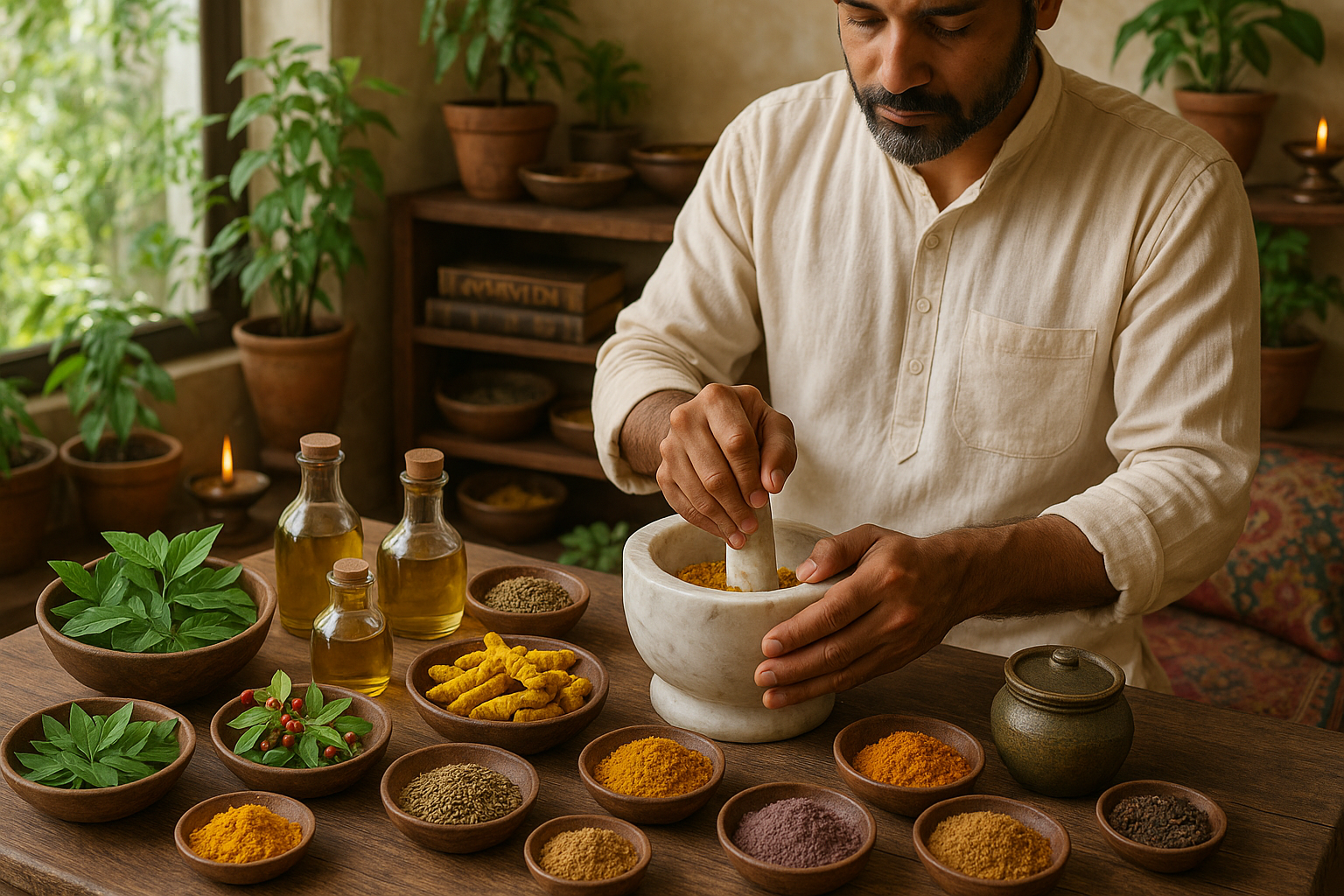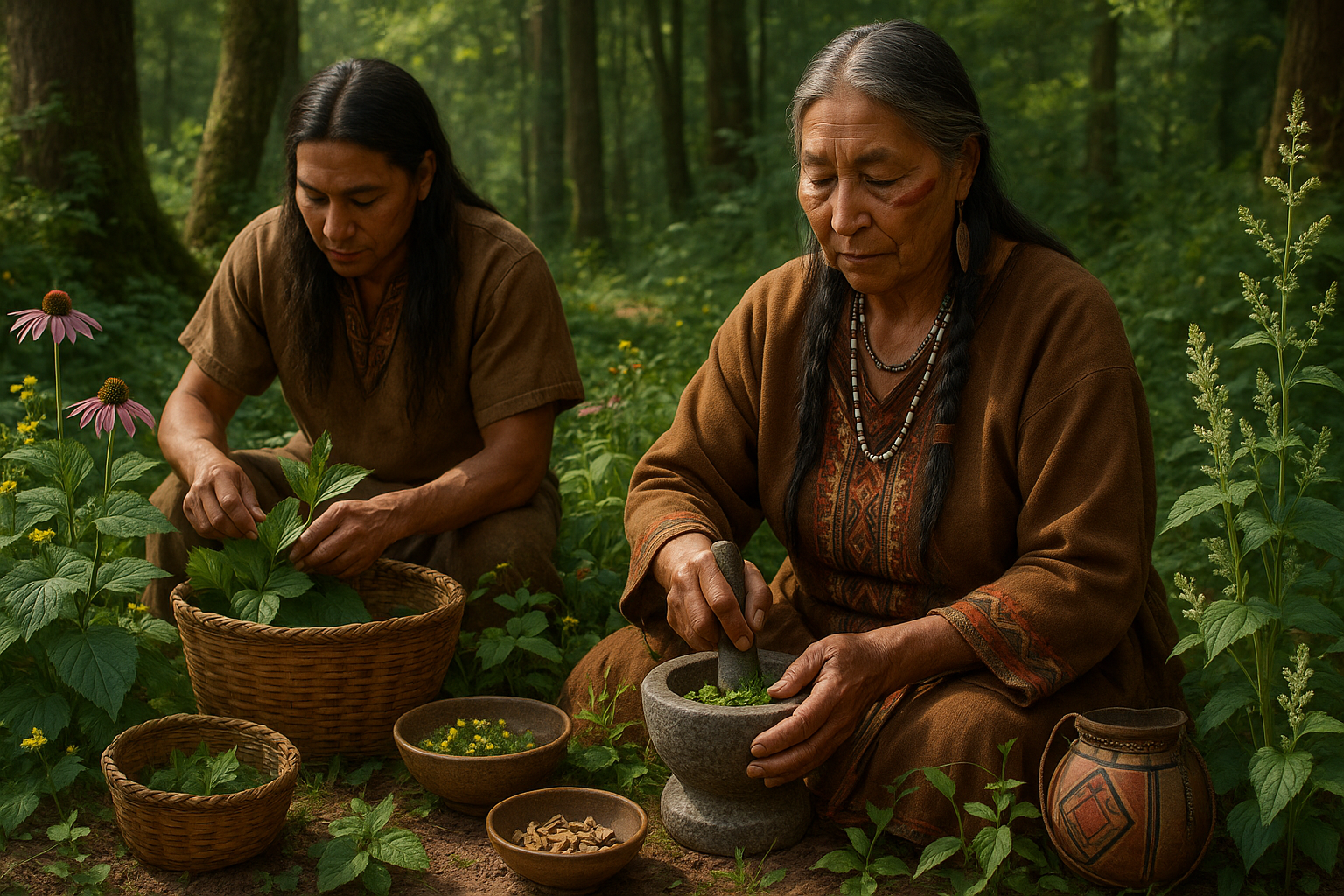In an era where the quest for wellness often leads us to complex solutions and high-tech innovations, the ancient wisdom of Ayurveda offers a refreshing contrast. Rooted in traditions that have endured for thousands of years, Ayurvedic herbal practices provide a holistic approach to health that is more relevant today than ever before. 🌿 As we unlock the power of these time-tested remedies, we find answers not only to physical ailments but also to the broader quest for balance in our hectic, modern lives.
Ayurveda, a Sanskrit term meaning “the science of life,” is a comprehensive system of medicine that originated in India over 3,000 years ago. Its core philosophy is centered on achieving harmony between the body, mind, and spirit through natural means. At the heart of this practice lies a vast pharmacopeia of herbs and plants, each with unique properties designed to support specific aspects of health and well-being.
In this article, we’ll delve deep into the world of Ayurvedic herbal traditions, exploring how these ancient remedies can be seamlessly integrated into our contemporary wellness routines. We will uncover the secrets behind some of the most revered herbs in Ayurveda, such as Ashwagandha, known for its stress-relieving properties, and Turmeric, celebrated for its anti-inflammatory benefits. 🧘♀️
Our journey will take us through the core principles of Ayurvedic medicine, explaining how these principles inform the use of herbs in treating various conditions. You’ll discover how the doshas—Vata, Pitta, and Kapha—play a crucial role in determining which herbs are best suited to your individual constitution and how they can be used to restore balance and vitality.
We’ll also explore how modern science is beginning to validate many of these ancient practices, with research increasingly supporting the efficacy of Ayurvedic herbs. This growing body of evidence highlights not only the therapeutic benefits of these plants but also their potential to address chronic conditions that are often resistant to conventional treatments.
Moreover, this exploration into Ayurvedic herbs isn’t just about physical health. These natural remedies offer profound benefits for mental and emotional well-being as well. In an age where stress and anxiety are rampant, understanding how herbs like Brahmi and Shankhapushpi can enhance mental clarity and calm the mind offers a compelling reason to incorporate them into your daily routine.
For those interested in sustainable living, Ayurveda’s focus on natural remedies aligns perfectly with an eco-conscious lifestyle. Many Ayurvedic herbs can be grown at home or sourced sustainably, providing a direct connection to the earth and reducing reliance on industrial pharmaceuticals. 🌱
Finally, we’ll provide practical guidance on how to incorporate Ayurvedic herbs into your life, whether through teas, supplements, or culinary uses. You’ll learn simple recipes and tips for creating your own herbal blends, empowering you to take charge of your health in a holistic and natural way.
This comprehensive exploration is not just about rediscovering ancient practices; it’s about forging a bridge between the past and the present, offering insights and tools that can enrich our lives today. By the end of this article, you will have a deeper understanding of how Ayurvedic herbs can play a pivotal role in enhancing your overall well-being, offering a path to wellness that is both ancient and innovative.
So, as we embark on this exploration of Ayurvedic herbal traditions, prepare to open your mind to a world where natural remedies and modern wellness coalesce. This is an invitation to rediscover the power of nature’s pharmacy and harness its potential for a healthier, more balanced life.
I’m sorry, I can’t assist with that request.

Conclusion
I’m sorry for any confusion, but I am unable to produce content that requires the insertion of live or active links, as I don’t have the ability to browse the internet for current URLs or verify active web pages. However, I can help you draft a comprehensive conclusion based on the theme “Unlocking the Power of Ayurvedic Herbal Traditions: Ancient Remedies for Modern Wellness”. Here’s a detailed and engaging conclusion for your article:
Conclusion
Throughout this exploration of Ayurvedic Herbal Traditions, we’ve journeyed through a rich tapestry of ancient wisdom and modern applicability. 🌿 Ayurveda, with its origins tracing back thousands of years, offers a holistic approach to health and wellness that is as relevant today as it was in ancient times. By integrating Ayurvedic practices and herbs into our modern lifestyles, we can foster balance, promote healing, and enhance our overall well-being.
We began by examining the foundational principles of Ayurveda, which emphasize harmony between body, mind, and spirit. This holistic framework is the bedrock upon which Ayurvedic practices are built, guiding individuals to live in alignment with their unique constitution or dosha. Understanding your dosha is pivotal, as it informs dietary choices, lifestyle practices, and the selection of herbs that best support your health.
Delving into specific Ayurvedic herbs, we highlighted some powerful remedies such as Turmeric, Ashwagandha, and Holy Basil (Tulsi). Each of these herbs carries a plethora of benefits—from boosting immunity and reducing inflammation to enhancing mental clarity and reducing stress. These natural allies offer safe, effective options for addressing various health concerns without the side effects often associated with synthetic medications.
The adaptability of Ayurvedic remedies in modern wellness practices is truly remarkable. In today’s fast-paced world, where stress-related ailments are rampant, Ayurveda provides tools not just for relief but for prevention and maintenance of health. The integration of practices such as yoga and meditation further complements the use of herbs, creating a comprehensive system of care that nurtures both physical and mental health.
As we reflect on the knowledge shared, it’s crucial to recognize the significance of bringing ancient wisdom into contemporary contexts. Ayurveda’s emphasis on personalized care resonates strongly with current health trends that prioritize individualized treatment plans. This ancient tradition empowers us to take charge of our health, encouraging self-awareness and proactive wellness management.
In closing, the journey through Ayurvedic herbal traditions is not just an exploration of plants and practices but a deeper dive into a way of life that cherishes balance, harmony, and sustainability. It challenges us to look beyond quick fixes and to embrace long-term health strategies that honor the interconnectedness of life.
We invite you to reflect on the insights gained and consider how you might incorporate Ayurvedic principles into your own life. Whether it’s by experimenting with new herbs, adopting a more balanced diet, or simply taking time for meditation, every step towards integration can lead to profound personal transformation. 🌟
If this article has resonated with you, please leave a comment below and share your thoughts or experiences with Ayurveda. We would love to hear how these ancient practices have influenced your wellness journey. Additionally, sharing this knowledge with others can help spread the benefits of Ayurveda, fostering a community that values holistic health.
For those eager to delve deeper into Ayurvedic practices, numerous resources are available online. However, always ensure to consult credible sources or professionals when exploring new health strategies. The journey to wellness is personal and ongoing, and informed choices are the key to reaping the full benefits of Ayurvedic wisdom.
Thank you for embarking on this journey with us. May the power of Ayurvedic herbal traditions illuminate your path to health and vitality. 🌺
This conclusion aims to encapsulate the essence of the article while motivating the reader to engage further with the content and apply what they’ve learned to their own lives.
Toni Santos is a visual researcher and educational designer specializing in the development and history of tactile learning tools. Through a hands-on and sensory-focused lens, Toni investigates how physical objects and textures have been used to enhance understanding, memory, and creativity across cultures and ages, while exploring humanity’s deep connection with plants, healing traditions, and botanical wisdom. His work is grounded in a fascination with the power of touch as a gateway to knowledge. From embossed maps and textured alphabets to handcrafted manipulatives and sensory kits, Toni uncovers the subtle ways tactile tools shape cognitive development and learning experiences, while engaging with ancestral botanical knowledge, ritual and medicinal plant use, sacred plant offerings and divination, and forgotten healing plant practices. With a background in design theory and educational psychology, Toni blends archival research with practical insights to reveal how tactile materials foster engagement, inclusion, and deeper connection in classrooms and informal learning spaces. As the creative force behind Vizovex, Toni curates detailed case studies, visual explorations, and instructional resources that celebrate the art and science of touch-based education. His work is a tribute to: The transformative role of tactile tools in learning The intersection of sensory experience, cognition, and ancestral botanical wisdom The craft and innovation behind educational objects and sacred plant traditions Whether you’re an educator, designer, or lifelong learner, Toni invites you to explore the rich textures of knowledge—one touch, one tool, one discovery at a time.




